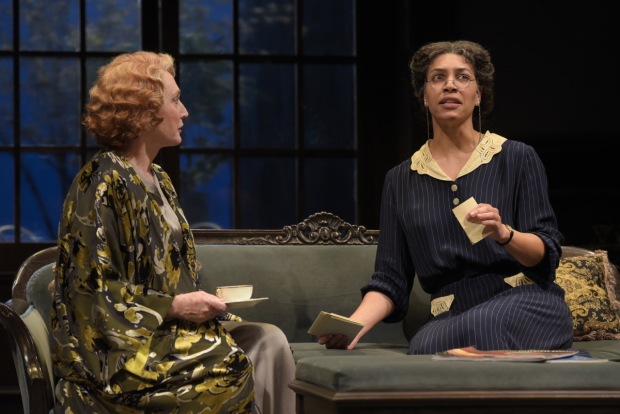Watch on the Rhine

(© Kevin Berne)
Lillian Hellman's Watch on the Rhine opened less than a year before the U.S. entered World War II, so there's no denying that her anti-fascism drama – really more of a drawing-room thriller – was timely and relevant to her audience. Here we are 76 years later staring down a coproduction of the play from the Guthrie Theater and Berkeley Repertory Theatre, and Watch on the Rhine has aged pretty darn well. The 1941 play will remain resonant, it seems, as long as there are power-wielding people in the world who, as described by one of the characters, are smart, sick, and cruel.
Though not Hellman's most famous play, Watch on the Rhine is a thunderclap of a play that could easily be retitled Resist! and will have no trouble capturing the attention of a modern audience attuned to current events. Directed by Berkeley Rep associate director Lisa Peterson, what's particularly interesting about the play is that it's not a "preaching to the choir" experience but rather one that wants people to stop talking and start acting.
Set in 1940, Rhine takes place in the posh country home of widow Fanny Farrelly (Caitlin O'Connell) as she awaits the return of her daughter, Sara (Sarah Agnew) after a 20-year absence. Spurning her mother's dreams of a high-society marriage, Sara married Kurt (Elijah Alexander), a German engineer, and has been raising their three children in the tumult of Europe in the 1930s.
With the family reunited in the Washington, D.C., suburbs, all should be safe and well, but it's not. Fanny has houseguests: a family friend, Marthe (Kate Guentzel), and her Romanian husband, Count Teck De Brancovis (Jonathan Walker). It seems the couple's financial situation is as precarious as their marriage. What Fanny (and everyone else) will soon realize is that she has gathered under her roof a staunch anti-fascist rebel in Kurt and an opportunistic Nazi sympathizer in the Count.
Though Hellman's dialogue can be ponderous and stagey, there's a fervor to it that director Peterson embraces, and the nearly three-hour, three-act drama steadily ratchets up the tension. By the third act, it becomes a thriller that actually delivers.
You can almost feel Hellman trying to rein in her passion by interjecting humor, which usually means the wisecracking Fanny, so sharply performed by O'Connell, gets off another good line or insult while swanning about in elegant 1940s finery designed by Raquel Barreto. Otherwise, this is pretty serious and grim going.
The more we learn about Kurt's resistance work since 1933 and Hitler's rise to power, the more we see Hellman creating an ideal of dignity and nobility in the face of creeping horror. Alexander's powerful performance allows us access to the complexity of Kurt's devotion to his country, his cause and his family. It all costs him dearly, and the scene in which he takes leave of his children (Emma Curtin, Silas Selnow, and Jonah Horowitz) is a guaranteed tear-jerker.
Sara, compassionately performed by Agnew, sympathizes deeply with her husband and shares his convictions to the extent that she has little patience for her mother's high-toned world, represented in the beautifully appointed country manse set by Neil Patel. "I just don't like polite political conversations anymore," she says. "Too much talk. By this time all of us must know where we are, and what we have to do. It's an indulgence to sit in a room and discuss your beliefs as if they were a juicy piece of gossip."
That's the crux of Watch on the Rhine. Talk soon turns to action, and the end of the play is really the beginning of the war. When the lights come up, a sense of doom lingers. "Shame on us," a character says toward the end, "thousands of years and we cannot yet make a world."










